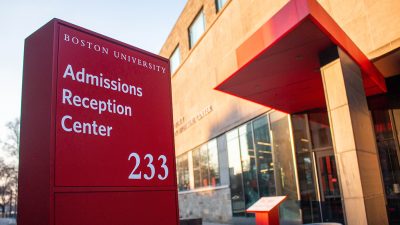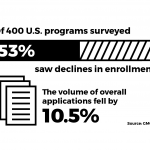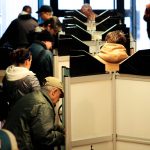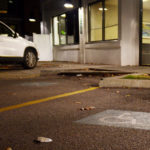
Boston University is one of several schools that received fraudulent test scores as part of the college admissions cheating scandal that rocked national headlines last week. Federal prosecutors charged 50 people who allegedly participated in a California-based scheme to buy spots in the freshman classes at competitive universities across the country.
During a press conference in Boston on March 12, Massachusetts U.S. Attorney Andrew Lelling announced the indictments and said while the scheme was nationwide in scope, it had several connections to the Boston area.
“Fake test scores, for example, were submitted to Boston College, Boston University and Northeastern,” Lelling said at the press conference. “Two of the defendants live in this state. A lot of the conspiratorial activities, phone calls, meetings, did happen here.”
BU spokesperson Colin Riley said he wanted to make it clear the university was not involved in the admissions scandal. Many people think universities in Massachusetts were involved, he said, because the indictment was announced in Boston.
“There’s a big difference between the places where there were people in those schools who were allegedly working and collaborating with the cooperating witness, [William] Singer, and between being a passive recipient,” he said.
Riley said while other schools were active participants in the scandal, BU was just a passive recipient of fraudulent test scores like many schools across the country.
BU athletics coaches are not permitted to speak with admissions officers regarding applications, he said, and no one in the admissions office has had a relationship with Singer.
“Every student’s application is given thoughtful and careful consideration in a holistic admissions process,” Riley said. “There are numerous factors beyond grades and standardized testing that are considered in reviewing and evaluating applications.”
Andrew Chiao, a student admissions representative, wrote in an email he works closely with the directors of admission and the current admission process. He wrote admissions takes into account merit, personal background extracurricular and service work, and family background.
“BU is an affirmative action school which I believe not only is valuable in its ability to draw in underrepresented students from minority backgrounds to the university, but also enriches the culture of BU and shows our dedication to bring high achieving students from all backgrounds to BU,” the College of Arts and Sciences junior wrote.
Chiao is also a member of Student Government, and he wrote SG has a sense of duty to represent the needs of all students on a college campus.
“This type of cheating one’s way into college should certainly have no place on a college campus,” Chiao wrote, “and Student Government completely acknowledges how this can immediately impact students of low-income who are disadvantaged.”
Paula Gutierrez, a sophomore in the Questrom School of Business, said the scandal is a reflection of the greater college admissions culture in the United States.
“Parents are willing to go to any extreme to guarantee entry for their children, and there are applicants who will end up attending schools that are far below where they deserve to be simply because they could not afford the better school,” Gutierrez said.
Gutierrez said she thinks this scandal blew up because of the status of the people involved, but she believes many more people have used wealth to pave the way for their kids’ college admissions into less prestigious schools, and for less money.
“I think there are applicants who also don’t get into schools because X number of spots gets reserved for students whose parents are going to be large donors to the school,” she said.
Sonja Gruzen, a former Division I athlete on the BU rowing team, said it was disheartening to learn there were spots taken away from potential rowers at the University of Southern California that were given to wealthy children who had never been involved in a sport.
“It takes energy, time and dedication to go through the recruitment process for college athletics,” the Questrom junior said, “and to learn that the daughters of Lori Loughlin posed on a rowing machine and photoshopped faces onto actual rowing photos is disrespectful to the program.”
Cristina Chiocca, a sophomore in CAS, said she thinks it is completely unfair some people can pay their child’s admission into a school they are not qualified for. Yet, she said she believes money is often used to influence admissions.
“All wealthy people have an advantage if they decide to use their money to get their children into schools,” Chiocca said, “because colleges want to have large endowments and love when donations are made.”




